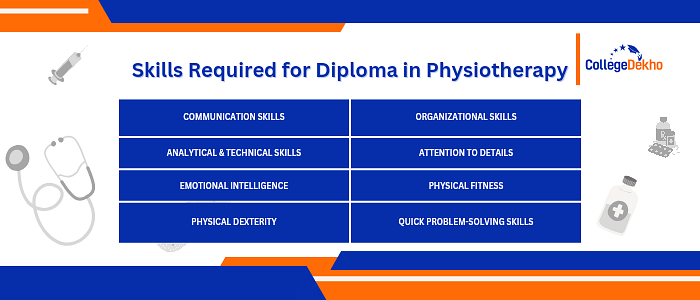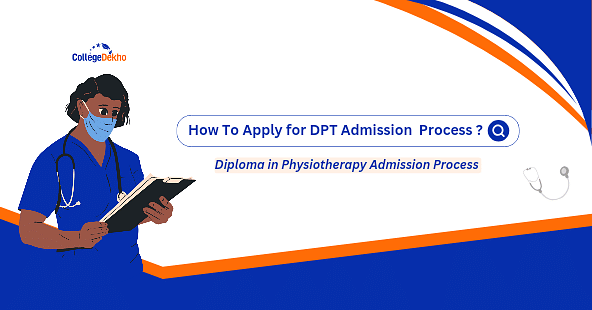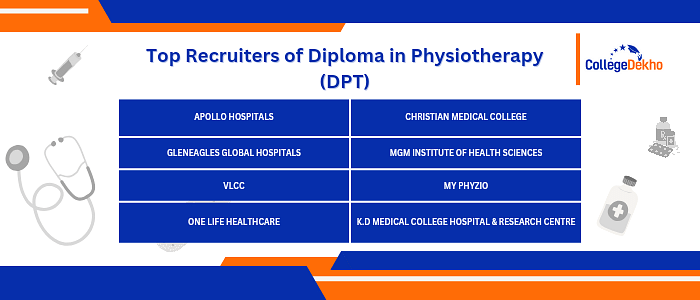Diploma in Physiotherapy
Diploma in Physiotherapy Overview
A Diploma in Physiotherapy is also known as DPT Course. Diploma in Physiotherapy is a 2-year professional course in the paramedical field. A DPT course teaches different rehabilitation techniques to students, and allows them to treat patients who have physical disabilities or have been injured. The Diploma in Physiotherapy syllabus includes subjects like Physiology, Biochemistry, Anatomy, Rehabilitation Science, etc. The Diploma in Physiotherapy course curriculum has been designed in a way to assist students to acquire scientific knowledge, enhance problem-solving skills, and develop technical and communication skills. The average DPT course fee ranges from INR 10,000 to INR 3 LPA.
Diploma in Physiotherapy Admission is granted to those who have completed their 10+2 with a minimum of 50% aggregate marks, in the science stream. Some colleges offer direct admission to DPT courses on the basis of merit. Madras Medical College, Christian Medical College, Aligarh Muslim University, and King George’s Medical University are some of the top Diploma in Physiotherapy or DPT colleges in India. Students can opt for a number of DPT job opportunities in different health institutions, defense medical organizations, the pharmaceutical industry, and orthopaedic departments. Salary after Diploma in Physiotherapy usually ranges from INR 2 LPA to INR 5 LPA in the initial years of career.
Table of Contents
- Diploma in Physiotherapy Overview
- Diploma in Physiotherapy Course Highlights
- Why Choose Diploma in Physiotherapy?
- Difference Between Diploma in Physiotherapy and BSc in Physiotherapy
- List of Popular Diploma in Physiotherapy Specialisations
- Diploma in Physiotherapy Eligibility Criteria
- Diploma in Physiotherapy Entrance Exams
- Diploma in Physiotherapy Admission Process
- What is Diploma in Physiotherapy Course Fees?
- Diploma in Physiotherapy Syllabus and Subjects
- Popular Diploma in Physiotherapy Colleges in India
- State-wise Diploma in Physiotherapy Colleges
- Top Government Diploma in Physiotherapy Colleges in India
- Top Private Diploma in Physiotherapy Colleges in India
- Study Diploma in Physiotherapy Abroad
- Top Colleges for Diploma in Physiotherapy Abroad
- Career Options ov Diploma in Physiotherapy in India
- FAQs about D.P.T.
Diploma in Physiotherapy Course Highlights
Here are the course highlights for a Diploma in Physiotherapy:
| Level of the course | Diploma |
|---|---|
| Course Name | Diploma in Physiotherapy |
| Also Known As | DPT |
| Total duration | 2 years |
| Examination type | Semester basis |
| Admission Process | Merit based or marks scored in entrance exams |
| Eligibility criteria | Class 12 with science stream and a minimum of 50% in exam results |
| Average Course Fee | INR 10,000 - INR 3 LPA |
| Job Profiles | Research Assistant, Lecturer, Sports Physio-Rehabilitator, Self Employed Private Physiotherapist. |
| Average salary | INR 3 LPA - INR 5.5 LPA |
| Top recruiters | Christian Medical Colleges, Apollo Hospitals, Gleneagles Global Hospitals, etc. |
Who Should Do a Diploma in Physiotherapy?
The following are the points that can help you determine if a diploma in physiotherapy is right for you.
- Individuals with a passion for helping others: Physiotherapy is a field that involves helping patients recover from injury or illness through rehabilitation and therapy services. If you have a strong desire to help others and make a positive impact in their lives, then a diploma in physiotherapy could be a good fit for you.
- Good problem solvers: Physiotherapists must be able to diagnose and treat patients' problems, evaluate the effectiveness of their treatments and make necessary adjustments. If you enjoy problem-solving and critical thinking, then a career in physiotherapy may be of interest to you.
- Strong interpersonal skills: Physiotherapy involves working closely with patients and communicating effectively with them to understand their needs and develop effective treatment plans. If you have strong communication skills, are empathetic, and enjoy working with people, then this field could be right for you.
- Physically active individuals: Physiotherapy involves hands-on work with patients, including manual therapy and exercise prescription. If you are physically active, have good manual dexterity, and enjoy hands-on work, then a career in physiotherapy may be a good fit.
- Interest in the medical field: A diploma in physiotherapy provides students with a solid foundation in anatomy, physiology, pathology, and rehabilitation. If you have an interest in the medical field and want to pursue a career in healthcare, then this program could be a good choice.
- Career advancement opportunities: Physiotherapy is a growing field with numerous career advancement opportunities. With further education and experience, physiotherapists can specialize in areas such as sports medicine, pediatrics, or geriatrics. Additionally, many physiotherapists go on to start their own private practices or work in multidisciplinary clinics.
- Good earning potential: Physiotherapy is a well-paying field with good earning potential. As a physiotherapist, you can expect to earn a good salary, with opportunities for growth and advancement throughout your career.
So a diploma in physiotherapy is a good choice for individuals who are passionate about helping others, enjoy problem-solving, have strong interpersonal skills, are physically active, and have an interest in the medical field. This program offers a range of career advancement opportunities and good earning potential, making it a worthwhile investment for those looking to make a difference in the lives of others.
Why Choose Diploma in Physiotherapy?

Many employers are on the lookout for specialists and physiotherapy in itself is a big and important part of medicine and public health. Moreover, the skills learned after studying Diploma in Physiotherapy are transferable skills and the scope of further education (undergraduate to PhD level) is also available. When considering a Diploma in Physiotherapy, here are some points to remember why choosing a Diploma in Physiotherapy is important and worthwhile:
- Physiotherapy is helpful for many people: Once someone studies a Diploma in Physiotherapy and becomes a physiotherapist, there are ample opportunities for a challenging, yet satisfying and rewarding career. Physiotherapists have the opportunity to make a difference in the lives of patients and improve their health by restoring normal functional movements.
- There is a huge requirement for physiotherapists in society: Society considers physiotherapists to be valuable members of society and they are well respected by everyone. With the help of physiotherapy, people who are suffering from chronic pain and sports injuries or are facing any challenges in mobility can find a way back to life with the help of the services offered by a physiotherapist.
- Diploma in Physiotherapy is a practical course: Students can find ample opportunities to work in the healthcare sector and also become self-employed after completing a Diploma in Physiotherapy.
- A severe shortage of physiotherapists in India: As per WHO’s mandate, there must be at least 1 physiotherapist for every 10,000 people and in India, the number of qualified individuals is nowhere close to this number. Hence, with this huge gap in the number of professionals, there’s a scope for building a promising career in physiotherapy.
- Good compensation: With a Diploma in Physiotherapy, candidates will be hired by hospitals, different nursing homes and care centres. On average, the income of a physiotherapist is INR 3-4 LPA in India. The chances of better compensation can also be derived from entrepreneurship where they own a physiotherapy clinic. Charges in such clinics can range from anywhere between INR 200 to INR 1000 for every session.
Difference Between Diploma in Physiotherapy and BSc in Physiotherapy
A detailed insight into the difference between Diploma in Physiotherapy and BSc in Physiotherapy has been mentioned below for reference:
| Particulars | Diploma in Physiotherapy or DPT | Bachelor in Physiotherapy or BPT |
|---|---|---|
| Course Duration | A Diploma in Physiotherapy or a DPT Course is a 2-year Diploma program. | A Bachelor in Physiotherapy or BSc in Physiotherapy is a 3-year undergraduate course. |
| Eligibility Criteria | Candidates who have completed their 10+2 with 50% marks in aggregate in the science stream can pursue this Diploma in Physiotherapy course. | Candidates who have completed their 10+2 with 50% marks in aggregate in the science stream can pursue this BSc in Physiotherapy course. |
| Course Details | A Diploma in Physiotherapy imparts scientific knowledge on students and helps them develop various skills such as problem-solving, technical and communication skills. This course also helps students to learn ways of improving disabilities in patients and help them heal from injuries with the help of massages and the use of physical therapy. | Bachelor in Physiotherapy is a course that mainly focuses on imparting in-depth knowledge to students on ways of treating and curing injured and/or disabled patients. It also involves practical and theoretical classes followed by internships. |
| Average Course Fee | Average course fee is INR 10,000 to INR 3 LPA | Average course fee is INR 35,000 to INR 5 LPA |
| Job Profiles | Job profiles for DPT courses include consultant physiotherapist, rehabilitation specialist, private practitioner, sports physiotherapist, assistant physiotherapist, etc. | Job profiles for BPT courses include therapy manager, osteopath, physiotherapist researcher, assistant physiotherapist, research assistant, sports physiotherapist, self-employed private physiotherapist, etc. |
| Top Recruiters | Top recruiters for students with a Diploma in Physiotherapy are gyms, fitness centres, sports clubs, defence medical organisations, pharmaceutical industry, colleges and universities, private practices, etc. | Top recruiters for students with a Bachelor in Physiotherapy are health institutions, defence medical establishments, fitness centres, educational institutions, orthopaedic departments, private clinics, equipment manufacturers, rehabilitation centres for handicapped, sports training facilities, schools for differently-abled children, hospitals, etc. |
List of Popular Diploma in Physiotherapy Specialisations
With a Diploma in Physiotherapy, students get an opportunity to be introduced to the world of physiotherapy. After the completion of a Diploma in Physiotherapy, there is a scope of studying a Bachelor in Physiotherapy or BPT (4 years of course duration followed by 6 months of internship), and Master of Physiotherapy or MPT (2 years of the course duration). Only after reaching this stage in one’s career, a student can opt for specialisations such as:
Specialization | Description |
|---|---|
Paediatric Physiotherapy | Specializes in the physiotherapy techniques that are involved in the treatment of children up to 14 years |
Sports Physiotherapy | Involves clinical study about the physiotherapy techniques that are used in the treatment in sports-related injuries and shocks |
Obstetrics Physiotherapy | Includes discussions about injuries and physiotherapy treatments related to gynecology and pelvic area |
Geriatrics Physiotherapy | Specializes in the study of post-operative all the physiotherapy techniques and diagnostic studies physiotherapy that are used in treating age-related problems in old people |
Orthopaedic Physiotherapy | Primarily focuses on the physiotherapic diagnosis of musculoskeletal and after cardiac operations in patients |
Post Operative Physiotherapy | Professionals of this specialization are highly trained in dealing the post operative pain, stress, and shock in patients using physiotherapy |
Cardiovascular Physiotherapy | Treating side effects of heart-related issues and handling patients after operations, is the main aim of this branch of physiotherapy |
Neurology Physiotherapy | Study under this branch deals with the treatment of persons with any kind of neurological disorders |
Diploma in Physiotherapy Eligibility Criteria
To consider applying for DPT admission, one must be mindful of the Diploma in Physiotherapy Eligibility Criteria in advance. The Diploma in Physiotherapy Eligibility Criteria states the respective points that every candidate must satisfy in order to be granted admission to DPT course. The DPT course eligibility criteria is defined by the respective institutions, however, almost all of them follow a similar structure for DPT admission structure. Thus, mentioned below are the basic Diploma in Physiotherapy Eligibility Criteria for candidates to refer to:
- All candidates must have passed their 10+2 or its equivalent from a recognized board.
- Candidates must have Physics, Chemistry, Biology/Mathematics as their mandatory subjects in their 10+2.
- It is crucial for the candidates to qualify the entrance exam with flying colors in order to be eligible for DPT admission.
- Candidates must not be less than 17 years of age while applying for Diploma in Physiotherapy admission.
Required Skills for Diploma in Physiotherapy
A diploma in Physiotherapy is a professional course that prepares students to work as physiotherapists and help individuals who are suffering from physical disabilities and injuries. To excel in this field, certain skills are essential for a student to possess. Here are some of the required skill sets for a diploma in physiotherapy:

Diploma in Physiotherapy Entrance Exams
While a Diploma in Physiotherapy or DPT Course does not require an entrance exam qualification for admission process, there may be some institutions who offer entrance exam qualifications for students wishing to pursue a DPT Course at their establishments. For studying Diploma in Physiotherapy, there are many entrance exams that one can appear and get admission in the program:
- IPU CET: IPU CET or Indraprastha University Common Entrance Test is accepted by all Indraprastha University affiliated colleges that offer DPT, BPT and MPT courses.
- LPUNEST Exam: LPUNEST is a National Entrance and Scholarship Test conducted by Lovely Professional University for those candidates who require scholarships in order to study different courses. This exam is conducted online.
- NEET Exam: National Eligibility cum Entrance Test is a national-level entrance exam conducted by the NTA (National Testing Agency) for admission to all courses across the medical field.
- CPNET Exam: CPNET is conducted by the Uttar Pradesh University of Medical Sciences. This is a state-level entrance exam for Combined Paramedical, Pharmacy and Nursing Entrance exam and it is conducted in offline mode.
Diploma in Physiotherapy Admission Process

Diploma in Physiotherapy Admission is conducted following the standard college admission procedure in general. While the code of conduct for Diploma in Physiotherapy admission may vary from one institution to another, the basic structure for the Diploma in Physiotherapy admission is entrance exam qualification. One may find all the necessary information regarding the DPT Course Admission in the points mentioned below:
- First, interested candidates should go through the eligibility criteria for DPT Course Admission at their desired college before applying for admission.
- All candidates must have completed their 10+2 or it's equivalent from a recognised board.
- The candidate must have had the following in their 10+2 curriculum as mandatory subjects: Physics, Chemistry, Biology and/or Mathematics.
- It is important to note that only candidates who secure a minimum of 50% marks in aggregate in their 10+2, will be considered for Diploma in Physiotherapy admission by the respective institutions.
- The common entrance examinations that are conducted for DPT admissions by various colleges are as follows: IPU CET, NEET, LPUNEST, and CPNET. The marks secured in the above-mentioned examinations are closely evaluated during the admission process by the colleges offering a Diploma in Physiotherapy admission.
- The commencement of the admission process or tye registration dates are announced by the respective colleges at their official website. Thus, it is important to check the institute's and keep a track of the current events prior to applying for DPT admission.
- All candidates are required to fill in the application form for DPT admission by mentioning the important details such as date of birth, name, age, and educational qualifications along with valid email ID and phone numbers.
- Eligible candidates are also required to upload their documents in a specified format and dimensions. All documents are to be verified at the time of the final screening in the DPT admission process.
- To confirm the application plea, candidates are required to pay a requisite fee during the form filling process.
- Finally, a counseling process is held for the shortlisted candidates and those who qualify for the Diploma in Physiotherapy admission, are then granted their admission pass into their desired colleges.
What is Diploma in Physiotherapy Course Fees?
While Diploma in Physiotherapy fee differs from one institution to another, here is a list of some of the top colleges in India offering Diploma in Physiotherapy along with their average course fees:
| Name of College | Average Course Fee |
|---|---|
| Chrisitan Medical College, Tamil Nadu | INR 22,130 |
| National Institute of Mental Health and Neuro Sciences, Bangalore | INR 54,000 |
| King George’s Medical University, Lucknow | INR 73,000 |
| National Institute of Management and Technology, Greater Noida | INR 1.53 LPA |
| Aligarh Muslim University | INR 2.16 LPA |
| Institute of Postgraduate Medical Education and Research | INR 15,000 |
| Era’s Lucknow Medical College and Hospital, Lucknow | INR 1.45 LPA |
| Teerthanker Mahaveer University | INR 60,500 |
| CMJ University | INR 56,000 |
| Mahatma Jyoti Rao Phoole University | INR 26,000 |
Diploma in Physiotherapy Syllabus and Subjects
The course duration for a Diploma in Physiotherapy is two years. Here is a tabular format of the Diploma in Physiotherapy syllabus pdf and subjects:
Diploma in Physiotherapy First Year Subjects:
Paper 1 |
Paper 2 |
Practical |
|---|---|---|
|
Anatomy and Physiology |
Anatomy and Physiology in terms of its relevance to physiotherapy |
Anatomy |
|
Elementary Nursing |
Medical and Surgical Nursing |
Fundamental Nursing, Medical Nursing and Surgical Nursing |
|
Elementary Biochemistry, Pathology, and Microbiology |
Elementary Pharmacology |
Elementary Pathology, Microbiology, and Biochemistry |
|
Hygiene and Sanitation |
Human Relations |
First Aid, Bandaging, and Casualty Evacuation |
|
Nutrition and Dietetics |
Community Health Nursing and Communicable Diseases |
Medical and Physiotherapy Equipment |
|
Biomedical Waste Management |
Equipment Management |
General Biomechanics |
Diploma in Physiotherapy Second Year Subjects:
Paper 1 |
Paper 2 |
Practical |
|---|---|---|
|
Pathology |
Physics of Heat and Heat Therapy |
General duties |
|
Orthopaedics |
Physics of Light and Light Therapy |
Massage manipulation, exercises, physical drill and yoga |
|
Massage Manipulation, exercises and physical drill ad yoga |
Physics of Electricity and Electro-therapy |
Physics of heat and heat energy |
|
Management of Medical and Surgical Emergencies |
Hydrotherapy |
Physics of Light and Light Therapy |
|
Pharmacology |
Occupational Therapy |
Physics of Electricity and Electro-therapy |
|
Medical subjects |
- |
Hydrotherapy |
|
Elementary physics and minor crafts |
Occupational Therapy |
|
|
Activity analysis |
Popular Diploma in Physiotherapy Colleges in India
Some of the popular colleges in India that offer Diploma in Physiotherapy degree programme are
| College/University | Average Fees |
|---|---|
| King George’s Medical University | Lucknow |
| Medical College Kolkata | Kolkata |
| Indian Institute of Health Education and Research | Patna |
| Bankura Sammilani Medical College | Bankura |
| Himalayan University | Itanagar |
| Eram Unani Medical College and Hospital | Lucknow |
| Shobhit University | Gangoh |
| Teerthanker Mahaveer University | Moradabad |
| National Institute of Health Education and Research | Patna |
| ADTU Guwahati, Assam DownTown University | Guwahati |
| Patna Institute of Nursing and Paramedical Science | Patna |
| Gopal Narayan Singh University | Rohtas |
| SCPM College of Nursing and Paramedical Science | Gonda |
State-wise Diploma in Physiotherapy Colleges
State wise division of colleges that offer Diploma in Physiotherapy degree course to their students are
| New Delhi | |
|---|---|
| College/University | City |
| Om Paramedical and Technical Institute | Delhi |
| Rajiv Gandhi Paramedical Institute | Delhi |
| Institute of Paramedical Science and Management | Delhi |
| Rajasthan | |
| Geetanjali Medical College and Hospital | Udaipur |
| Apex Group of Institutions | Rampur |
| Mewar University | Chittorgarh |
| NIMT Institute of Management | Ghaziabad |
| Jayoti Vidyapeeth Women’s University | Jharna |
| Shirdhar University | Pilani |
| OPJS University | Churu |
| Uttar Pradesh | |
| Teerthankar Mahaveera University | Moradabad |
| NIMT Educational Institutes | Noida |
| Avadh Institute of Medical Technologies and Hospital | Kapasi |
| St. Mary S College of Nursing | Lucknow |
| GCRG | Lucknow |
| Tamil Nadu | |
| Sherlin Marin Para Medical College | Thanjavur |
| Grace Group of Institutions | Mala |
| West Bengal | |
| SEC | Kolkata |
| Kingston College of Science | Barasat |
| Seacom Skills University | Kolkata |
| Institute of Paramedical Science and technology | Kolkata |
Top Government Diploma in Physiotherapy Colleges in India
Some of the top government Diploma in Physiotherapy institutions in India are:
| Institution Name | NIRF2023Rankings |
|---|---|
| Tamil Nadu Open University, Chennai | - |
| Regional College of Paramedical Health Sciences, Guwahati | - |
| Composite Regional Centre, Srinagar | - |
| Bankura Sammilani Medical College, Bankura | 25 |
| Assam Medical College, Dibrugarh | - |
| UPUMS Saifai - Uttar Pradesh University of Medical Sciences, Saifai | - |
| NRS Medical College - Nilratan Sircar Medical College, Kolkata | - |
| KGMU Lucknow - King George's Medical University, Lucknow | 12 |
Top Private Diploma in Physiotherapy Colleges in India
Some of the top private Diploma in Physiotherapy institutions in India are:
| Institution Name | NIIRF Rankings 2023 |
|---|---|
| DMIHER - Datta Meghe Institute of Higher Education and Research, Wardha | 25 |
| Arunachal University of Studies, Namsai | 45 |
| Asian Institute of Paramedical Sciences, Guwahati | - |
| Dr KR Adhikary College of Optometry and Paramedical Technology, Kalyani | - |
| Goutham College of Physiotherapy, Bengaluru | - |
| National Institute of Health Education and Research, Patna | - |
| Saint Mary's College of Nursing and Paramedical Institute, Lucknow | - |
| Shri Venkateshwara University, Amroha | 52 |
Study Diploma in Physiotherapy Abroad
Physiotherapy is the study of various processes of rehabilitation of people who have suffered from physical trauma with the help of different therapeutic exercises and movements. Physical trauma can occur from sports injuries, accidents, or certain illnesses. As the nature of illness and/ or trauma differ from one patient to another, it is the job of a physiotherapist to develop a treatment plan that will work for a specific patient. So studying physiotherapy involves gaining in-depth knowledge from theory as well as getting hands-on experience from practical classes.
When it comes to studying physiotherapy abroad, there are no diploma courses available for students willing to pursue a career in physiotherapy. However, there are excellent undergraduate and postgraduate programmes available and they offer the required knowledge and experience for someone to become a professional and certified physiotherapist.
Here are some advantages of studying a physiotherapy course abroad:
Experience high-quality teaching and training
In most countries abroad offering physiotherapy courses, the quality of education imparted to students is class apart as these countries are exclusively known for their extraordinary healthcare systems and initiatives. Hence, the training received by students who are willing to study physiotherapy courses abroad will also be top-notch.
Increase in Demand
With each passing year, more and more people are leaning towards the use of physiotherapy and not traditional medication owing to the efficiency and cost-effectiveness of the former in comparison to the latter option. It is because of this increase in demand for physiotherapy that the number of certified physiotherapists is also increasing steadily. In such a scenario, holding a degree in physiotherapy from a recognized university will help students take their careers to different heights.
Affordability
If you are someone who is deeply interested in being a part of the medical industry but courses such as MBBS are too expensive and time-consuming for you, getting a degree in physiotherapy will solve the problem. A course in physiotherapy is comparatively less expensive and can be completed within a shorter period of time in comparison to a full-fledged MBBS course. This way, you will be able to work in the healthcare sector and not have to spend a fortune in doing so.
Top Colleges for Diploma in Physiotherapy Abroad
There are many colleges and universities abroad offering various courses in physiotherapy. Here is a comprehensive list of popular colleges and universities across the globe offering physiotherapy programmes to international students:
- University of Washington
- Harvard University
- University of Michigan
- University of Pittsburgh
- Mayo Clinic College of Medicine and Science
- University of Toronto
- University of Sydney
- Johns Hopkins University
- University of Queensland
- Stanford University
- University of California
- University of North Carolina at Chapel Hill
- Duke University
- University of British Columbia
- McMaster University
- Karolinska Institute
- Northwestern University
- University of Minnesota
- University of Pennsylvania
- University of Alberta
- University of Oxford
Career Options ov Diploma in Physiotherapy in India
After completing a Diploma in Physiotherapy, there are immense job opportunities in the field of physical therapy in India. For example, one can operate at community health centres, mental health care centres, rehabilitation facilities, various nursing and private care centres, hospitals, and sports clinics.
There are also options of opting for undergraduate and postgraduate courses in physiotherapy after completing a Diploma in Physiotherapy. Apart from these options, candidates can also choose Bachelor of Occupational Therapy and MSc in Occupational Therapy as a further course of education. Various other career options for a Diploma in Physiotherapy include:
| Job Roles | Details |
|---|---|
| Physiotherapist | A physiotherapist’s job is to help and promote movement and exercise with the help of manual treatment, education and counselling for those who have suffered from any trauma or have been suffering from illnesses and disability. Physiotherapists are also instrumental in keeping people of all ages healthy by helping them manage pain and prevent diseases. |
| Sports Physiotherapist | When people suffer from injuries due to the practice of any sport or during any exercise session, a sports physiotherapist comes into play. It is the job of the sports physiotherapist to offer assistance due to such injuries and also provide recommendations for playing safely. Athletes in general benefit greatly from the assistance provided by a sports physiotherapist. |
| Occupational Therapist | An occupational therapist is a skilled healthcare professional whose responsibility is to provide help to patients who are suffering from temporary or permanent disabilities. With the help of an occupational therapist, such patients can perform day to day tasks independently or with/without the help of assistive technology. Occupational therapists are also recruited by hospitals and different healthcare settings where they work with patients suffering from various chronic illnesses like diabetes or people who have undergone surgical procedures such as organ transplants. |
Salary After Diploma in Physiotherapy
The salary of a candidate with a diploma in physiotherapy is greatly determined by a number of factors such as college/institute/university from which one has acquired the degree, skills possessed by the candidate, and years of experience. However, on average, a physiotherapist has the scope of earning anywhere between INR 3-5 LPA during the first few years of their career. With further specialization and experience, the income can go up to INR15 LPA as well.
| Job Profiles | Average Salary |
|---|---|
| Physiotherapist | INR 3 LPA |
| Sports Physiotherapist | INR 3.8 LPA |
| Occupational Therapist | INR 3 LPA |
| Consultant Physiotherapist | INR 4 LPA |
| Rehabilitation Specialist | INR 3.5 LPA |
| Private Physiotherapy Practitioner | INR 5 LPA |
Top Recruiters of Diploma in Physiotherapy
There are many prestigious organizations and medical colleges that offer employment opportunities to students pursuing a Diploma in Physiotherapy or DPT Course. Not only are these job opportunities available across the country but they are also supported by lucrative salary packages. Career opportunities in Diploma in Physiotherapy are available in both government and private sectors. Therefore, a few examples of the top recruiters of Diploma in Physiotherapy (DPT) are mentioned below for reference.

FAQs about D.P.T.
What are the eligibility criteria to study a Diploma in Physiotherapy?
To study Diploma in Physiotherapy, candidates need to be at least 17 years of age, complete their 10+2 exam with PCB as core subjects and achieve 50% aggregate marks. Some colleges also require students to appear in entrance exams.
What are the entrance exams for Diploma in Physiotherapy?
IPU CET, LPU NEST, BCECE, and CPNET are some of the entrance exams for studying a Diploma in Physiotherapy.
How much is the course duration for Diploma in Physiotherapy?
The course duration of the Diploma in Physiotherapy is 2 years.
How is Diploma in Physiotherapy different from Bachelor in Physiotherapy?
A Diploma in Physiotherapy is a diploma course whereas a Bachelor in Physiotherapy is an undergraduate course. Moreover, the course duration for the former is 2 years while the latter takes 4.5 years to complete.
What is a Diploma in Physiotherapy fees?
Diploma in PhysiotherapyThe course fee depends on the college/university. However, the average range is INR 10,000 to INR 1,50,000 per annum.
Is there a scope for studying for a Diploma in Physiotherapy abroad?
While the scope of studying Diploma in Physiotherapy abroad is not available, there are plenty of undergraduate and postgraduate courses available for students to choose from.
Is a Diploma in Physiotherapy a useful degree?
A Diploma in Physiotherapy is a career-oriented course and it can help students to introduce themselves to the healthcare industry and the field of medicine without having to study a full-fledged MBBS course.
What is the minimum score required for entrance exams of a Diploma in Physiotherapy course?
The minimum marks vary every year and are determined by a number of factors such as the total number of applicants.
What can I study after a Diploma in Physiotherapy?
Students can opt for a Bachelor of Physiotherapy or Bachelor of Occupational therapy after completing Diploma in Physiotherapy.
Do I need to sit for an entrance exam to study for a Diploma in Physiotherapy?
No, entrance exam scores are not mandatory and it depends on the college or university.
Related Questions
Popular Courses
- Courses
- Diploma in Physiotherapy










